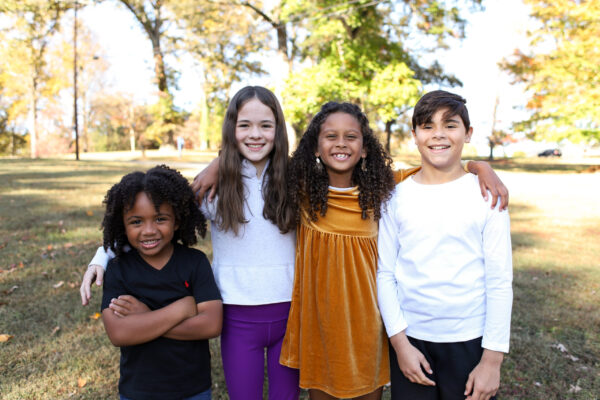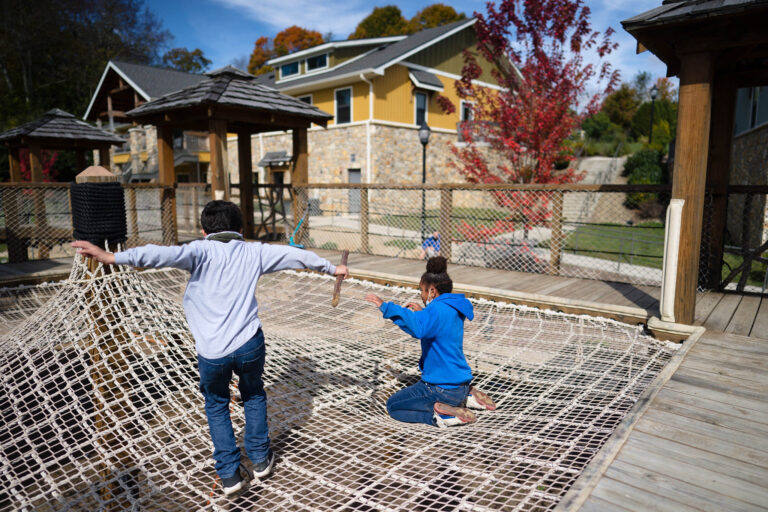Why is staying together important for siblings?
For many children in foster care, their sibling has been the only constant presence in their lives. A sibling may be the only person who understands, shares their experiences and can help them make sense of their new lives. Keeping sibling groups together can maintain a sense of togetherness while preventing a lifetime of longing, otherness, and separation trauma between brothers and sisters.
For people who are planning to adopt more than one child, adopting a sibling group could take less time. It can also result in only one period of transitioning of children into a family group. Studies have found that placing siblings in the same foster home is associated with higher rates of placement stability, reunification, adoption and guardianship.
Crossnore Sibling Group Placements
- Crossnore has several foster families who believe in keeping siblings together. The Immordino family became interested in fostering to adopt after witnessing a friend of theirs go through the process. The Immordinos felt moved to grow their family in the same way and in early 2022 began fostering two sisters. In late 2023, they accepted their brother. The children are part of a sibling group of seven. The Immordinos aim to set up monthly playdates to maintain their sibling bond, which they plan to continue beyond their adoptions. The Immordinos stated, “we could have missed this opportunity. We are so thankful that we said yes. The blessings outweigh the stressful moments. It brings us great joy to see our children together and thriving. If you feel a tug in your heart that this might be for you, do it because the rewards are worth it.”
- When going through the licensing process, the Safewright family noticed that most families couldn’t/didn’t feel that they could care for two or more children. They felt strongly about keeping a large sibling group together to reduce the trauma of coming into foster care. Their first placement of three children, almost four years ago, are very close to reaching permanency through adoption. The Safewrights accepted a fourth sibling along the way, who they also plan to adopt. They also maintain monthly visits with an 18 year old half sibling to the children in their care. Their half sibling exited foster care at 18 but really cared about maintaining a relationship with his younger siblings. The Safewrights say, “it’s not as scary as you think it will be.” Caring for siblings usually means they come into care with an already established bond which can reduce stress during an often traumatic transition. The Safewrights feel joyful in witnessing the love and laughter that all siblings should be able to enjoy and experience while growing up. “There is a great need for this, if you think you are capable of fostering then you are – listen to your heart.”
- The Yates family had no idea they wanted to care for sibling groups. However, their first placement was for two siblings and a few months later, the third sibling joined them. In less than 6 months, the Yates went from a couple wanting to be first time parents to a family of five! The Yates stated “it is a wild ride that they are still figuring out.” They continued to say some days are really hard but can’t imagine life with their four year old twins and the younger sister being separated into different homes. Watching the sisters interact, discover and grow together is an irreplaceable feeling for the Yates. Mrs. Yates hears people say frequently, “oh I couldn’t do that, but you can. If you are hesitant at first, start with respite.” Mrs. Yates stated that “they will never take their free time for granted but they wouldn’t change their current situation for the world.”

Siblings Groups in Care
Over the last two years, 57% of Crossnore’s community foster care referrals were for a sibling set of two. Approximately two-thirds of children in foster care in the United States have a sibling in care. Many of these children will be separated from their siblings. A common reason given for separations is that workers could not find a permanent placement for all of the children.
What You Can Do:
If you’d like to explore foster parenting – contact our Foster Parent Recruitment Coordinator, Sara Huffman at 828-260-7071 or shuffman@crossnore.org.
If you’d like to help families who are caring for children in foster care, you can call (336) 721-7600 or visit www.crossnore.org.



